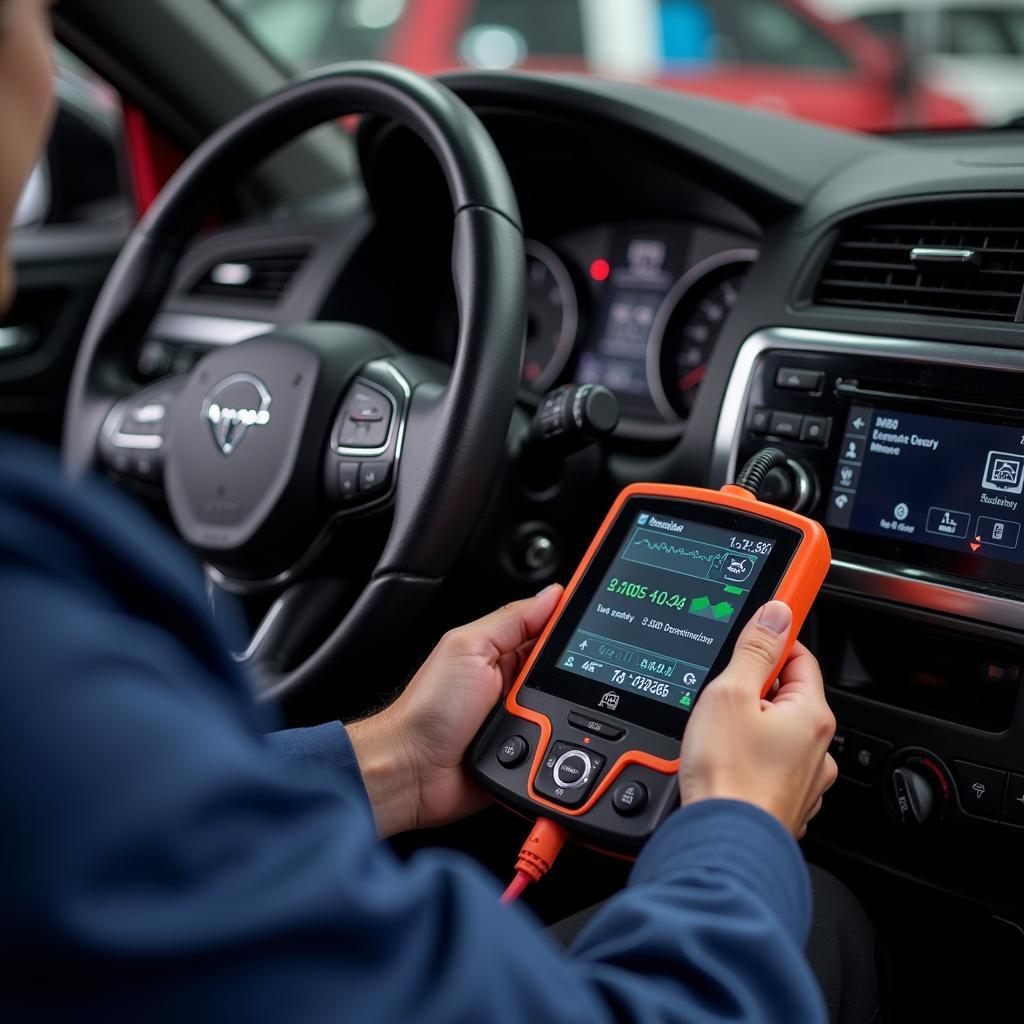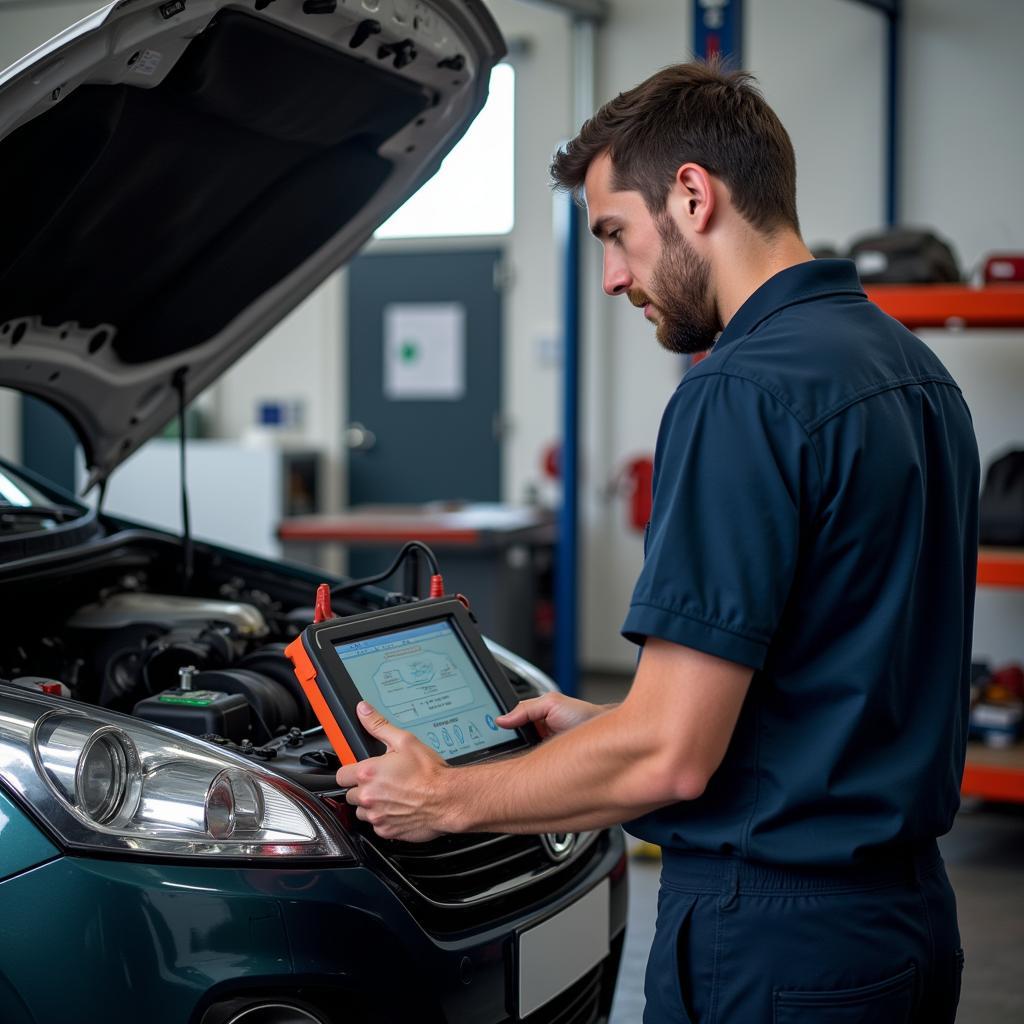The automotive industry is undergoing a technological revolution, and at the heart of this transformation lies Car Diagnostic Equipment. No longer just a tool for mechanics, this sophisticated technology is becoming increasingly crucial for vehicle owners and businesses alike. But navigating the world of car diagnostic equipment can feel overwhelming with so many options available. This comprehensive guide will equip you with the knowledge to make informed decisions about this vital technology.
Understanding Car Diagnostic Equipment
At its core, car diagnostic equipment acts as a window into your vehicle’s computer system. It allows you to communicate with the various electronic control units (ECUs) that manage everything from engine performance to safety features. By reading and interpreting data from these ECUs, diagnostic equipment can:
- Identify fault codes: Pinpoint the source of warning lights on your dashboard.
- Monitor live data: Track real-time performance metrics like engine speed, temperature, and fuel pressure.
- Perform component activations: Test individual components like actuators and sensors.
- Program and reprogram ECUs: Update software or configure settings within the vehicle’s systems.
 Car Diagnostic Equipment in Action
Car Diagnostic Equipment in Action
Types of Car Diagnostic Equipment
The market offers a wide array of car diagnostic equipment, catering to diverse needs and budgets. Here’s a breakdown of the most common types:
1. Code Readers: These entry-level devices primarily read and clear basic diagnostic trouble codes (DTCs) stored in the vehicle’s computer. They are affordable and user-friendly, making them suitable for DIY enthusiasts.
2. OBD-II Scanners: A step up from code readers, OBD-II scanners offer more advanced features, including live data streaming, freeze-frame data, and the ability to access manufacturer-specific codes. They are valuable for home mechanics and small workshops.
3. Professional Diagnostic Scan Tools: These comprehensive tools are the industry standard for professional mechanics and workshops. They provide access to all vehicle systems, advanced programming functions, and a wealth of diagnostic information.
4. Oscilloscopes: For in-depth electrical system analysis, oscilloscopes are indispensable. They visually display electrical signals, allowing technicians to diagnose complex issues related to sensors, actuators, and wiring.
Choosing the Right Car Diagnostic Equipment
Selecting the appropriate car diagnostic equipment depends on your specific requirements. Consider the following factors:
- Budget: Establish a realistic budget, as prices can vary significantly.
- Vehicle Compatibility: Ensure the equipment supports the make, model, and year of your vehicle, especially if you own older models.
- Features: Identify the essential features for your needs, such as live data, bi-directional controls, or specialized functions.
- User Friendliness: Opt for equipment with an intuitive interface and clear instructions, especially for beginners.
The Benefits of Investing in Car Diagnostic Equipment
Investing in car diagnostic equipment, whether you’re a car owner or a business, offers numerous advantages:
For Car Owners:
- Early Problem Detection: Identify potential issues before they escalate into costly repairs.
- Cost Savings: Avoid unnecessary trips to the mechanic for simple diagnostics.
- Increased Vehicle Knowledge: Gain a deeper understanding of your car’s inner workings.
- Empowerment: Take control of your vehicle’s maintenance and repair decisions.
For Businesses:
- Improved Diagnostic Accuracy: Enhance the efficiency and effectiveness of vehicle repairs.
- Increased Customer Satisfaction: Provide faster and more reliable diagnostic services.
- Competitive Advantage: Differentiate your business by offering advanced diagnostic capabilities.
 Mechanic Using Diagnostic Equipment in a Workshop
Mechanic Using Diagnostic Equipment in a Workshop
The Future of Car Diagnostic Equipment
As vehicles become increasingly sophisticated, car diagnostic equipment will continue to evolve. We can anticipate advancements such as:
- Wireless Connectivity: Seamlessly connect to vehicles wirelessly using Bluetooth or Wi-Fi.
- Cloud-Based Diagnostics: Access remote diagnostics and data analysis capabilities.
- Artificial Intelligence (AI): Utilize AI-powered diagnostics for faster and more accurate fault identification and predictive maintenance.
Conclusion
Car diagnostic equipment is no longer optional but essential in today’s technologically advanced automotive landscape. By understanding the different types, features, and benefits, you can make informed decisions about investing in the right equipment to meet your specific needs. Whether you’re a car enthusiast seeking to empower yourself or a business aiming to elevate your services, car diagnostic equipment is a wise investment in the present and future of automotive technology.
FAQs
1. Can I use any car diagnostic equipment on my vehicle?
Car diagnostic equipment needs to be compatible with your vehicle’s make, model, and year. Check the manufacturer’s specifications to ensure compatibility.
2. What is the OBD-II port?
The OBD-II port is a standardized 16-pin connector usually located under the dashboard on the driver’s side. It provides access to the vehicle’s computer system for diagnostics.
3. Do I need to be a mechanic to use car diagnostic equipment?
While professional-grade equipment requires specialized knowledge, many user-friendly options are available for DIY enthusiasts and car owners.
4. Can car diagnostic equipment fix problems with my car?
Diagnostic equipment primarily identifies problems. Repairing them typically requires mechanical expertise and tools.
5. What are some reputable brands of car diagnostic equipment?
Several reputable brands offer high-quality car diagnostic equipment, including Autel, Launch, Snap-on, and Bosch, among others.
6. Where can I purchase car diagnostic equipment?
You can purchase car diagnostic equipment from various sources, including online retailers, automotive parts stores, and specialized equipment suppliers.
7. How often should I use car diagnostic equipment?
It’s recommended to use car diagnostic equipment whenever your vehicle displays warning lights or experiences performance issues. Regular check-ups can also help identify potential problems early on.
Common Car Diagnostic Questions:
We often receive questions about specific car diagnostic issues, such as:
- “Why is my check engine light on?”
- “How do I reset my car’s computer?”
- “What does this specific fault code mean?”
- “Can I trust the diagnostic information from my code reader?”
Our website provides detailed information and resources to help you understand and address these common car diagnostic questions.
Explore More Car Diagnostic Resources
For further insights and information on car diagnostic equipment, we encourage you to explore the following resources on our website:
- Car Diagnostic Equipment UK
- Car Diagnostic Equipment Top of the Range
- Car Diagnostic Equipment Northern Ireland
- Facilatys on Car Diagnostic Equipment
Need expert assistance with your car diagnostic needs? Our team is here to help! Contact us via WhatsApp: +1(641)206-8880 or Email: [email protected]. We offer 24/7 customer support to address your queries and provide guidance.

Leave a Reply